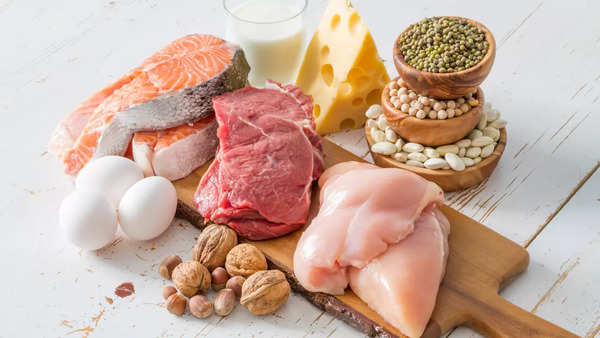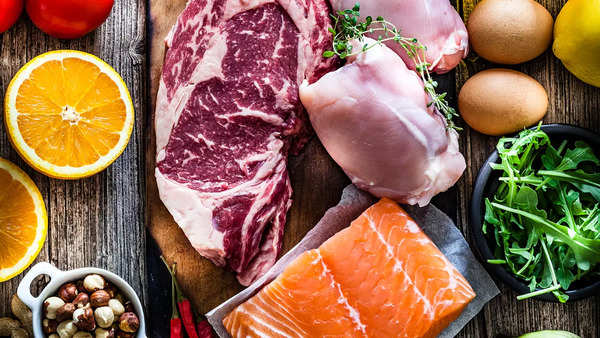Protein when not eaten in sufficient amounts might lead to change in several body functions.In this article, let us discover the importance of having a protein-sufficient diet and the repercussions of not getting protein in your diet and how it can affect different aspects of health.
Muscle Mass Proteins: These are the building blocks of our muscles. Researchers recommend 0.8 g/kg/d, and reflects the minimum amount of dietary protein required to meet the amino acid requirements, and to prevent muscle mass loss. When there is insufficient intake of protein the body may resort to breaking down the existing muscle mass to obtain enough proteins. This process may lead to muscle wasting, weakness, and an overall decrease in muscle mass.
Also Read:6 diet tips for vegetarians to improve their protein consumption
Weakened Immune System: A robust immune system is very crucial for defending a body against infections and illnesses. They play a pivotal role by producing the antibodies and other immune system components. Insufficient protein intake compromises the body’s ability to produce an enough protein response making individuals more susceptible to allergies and infections.
Impaired Wound Healing: Proteins are integral in the process of repairing and regeneration of tissues, collagen a structural protein, is essential for the formation of new cells and healing of wounds. Protein decreases an inflammatory response in our bodies. A deficiency in protein can impede this process leading to delayed wound healing and increases susceptibility to infections.

Fatigue and Generalized Weakness: Inadequate protein intake affects the muscles responsible for our posture and movement. Over the period a lack of protein makes us lose muscle mass which in turns cuts the strength, makes it harder to keep our balance and slows down our metabolism. An important part of our blood called haemoglobin is made up of protein, heme is the iron part and globin is the protein part. Deficiency in protein may also lead to haemoglobin insufficiency thus contributing to fatigue and anemia.
Hair, Skin and Nail Issues: Proteins are essential for the health and vitality of hairs, skin, and nails. Collagen, elastin, and keratin— 3 types of structural proteins are abundant in these tissues which contributes to strength, elasticity, and overall integrity. Therefore, we need to consume an adequate amount of protein as well as specific vitamins and minerals which will boost this process.
Also Read:9 protein-rich foods that are assumed to be healthy, but are not
Mood Changes: Amino acids, the building blocks of proteins, contribute to the synthesis of various neurotransmitters that regulate mood namely serotonin, dopamine and norepinephrine are three neurotransmitters that are influenced by protein intake. A deficiency in protein can lead to imbalances in synthesis of these neurotransmitters resulting in mood swings, irritability, and development of various mental disorders.

Hormonal Imbalances: Protein-rich foods are important for hormonal balance as they provide the body with building blocks needed to make hormones that regulate various physiological processes including metabolism, growth, and reproductive health. Insufficient protein intake can disrupt the hormonal balance, potentially affecting the menstrual cycle in women, reproductive health in both the genders and overall metabolic function.
Managing Weight and Sugar Levels: Eating protein slows down the absorption of glucose into the bloodstream, which in turn prevents the sugar spike thereby regulating insulin levels and preventing imbalances. Protein-rich foods also maintain satiety for a longer period which can prevent overeating and weight gain.

To conclude, the repercussions of insufficient protein intake are far-reaching, affecting various facets of health. To control these effects, it is crucial to prioritize a well-rounded diet that includes diverse sources of protein. Lentils, legumes, nuts, green peas, quinoa, soy milk, oats, chia seeds, and dairy products are all excellent choices to ensure an adequate and varied protein intake. Incorporating protein supplements into your diet is an excellent strategy to ensure your body meets its protein requirements. Several plant-based protein supplements are now available in the market. This option is beneficial for vegetarians and vegans who need to conscientiously manage their daily protein intake. Make sure to choose authentic and clean nutrition brands only. Remember, maintaining a balanced and diverse diet is key to supporting the nutrients required for a healthy body and mind. By understanding the importance of protein and making informed dietary choices, you can pave the way for long-term health and well-being.
Contributed by: Avantii Deshpaande, Clinical nutritionist and gut health expert at Fast&Up
Thumb and Embed Images Courtesy: istock

